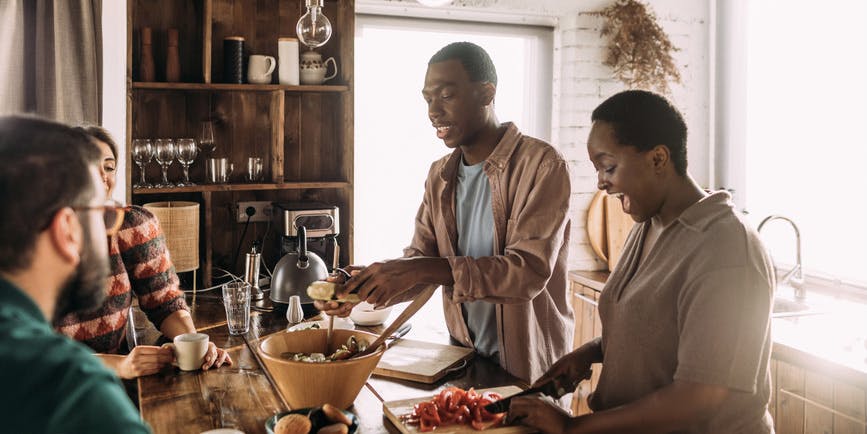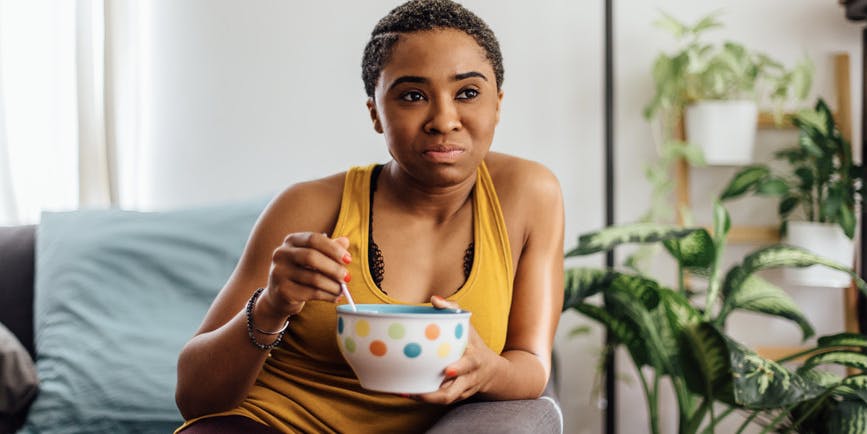
What’s the best way to optimize your nutrition? Here’s what the science says.

Topics
Nutrition is simple, right? Eat a variety of delicious, healthy foods + enjoy treats in moderation. Yet somehow, we humans have thrown simplicity out the door.
This week, we’ll review recent studies detailing places we’ve missed the mark—and where doing less can get us back on track. Then, we’ll close with an all-Covid-19 healthcare update. Because, yeah, the summer wave hasn’t let up yet.
Let’s dig in.
- The Checkup: stress + food + fact-checking
- Salad Gold: salt + macros + multivitamins
- Healthcare: all the Covid-19 news to know
The Checkup:
- A historian explains the origin of food labels
- Bloated + can’t sleep? It might be your salad
- 95% of people w/ IBD have a spot in their DNA
- Let’s fact-check myths about probiotics
- Here’s how Team USA will eat at the Olympics
- Election stress? Try these coping strategies
- Do you need electrolytes in extreme heat?
- Actor training to use lightsabers is intense!
- How (and why) to grill a head of cauliflower
Salt + the microbiome

When it comes to microbiome health, most of us think about taking probiotics or upping our fiber intake. But as reported in the Washington Post, we should be considering the salt we eat, too.
Studies show that too much sodium inhibits microbiome diversity, which is linked to higher weight, high blood pressure (hypertension) and other chronic health issues. It can encourage the collection of harmful bacteria in the gut. And it can repress bacteria that support our immune system or fight inflammation.
The good news? If we lower our salt consumption, our gut rebounds pretty quickly. In one robust study, participants with untreated hypertension who reduced their sodium intake for just six weeks had higher levels of short-chain fatty acids (which aid digestion and reduce inflammation, among other things), lowered blood pressure and improved blood vessel health!
Most Americans eat too much salt. So head to the article for more details and expert tips.
Should you track your macros?

Macro tracking involves eating a specific number of grams of protein, fat and carbohydrates daily, depending on our health goals. According to the New York Times, it’s a hot health trend. But does it work?
Experts say tracking can help those with conditions like high cholesterol or insulin resistance reduce their sodium or glycemic load. Otherwise, weighing out every blueberry or avocado slice is more likely to cause burnout than help. At worst, it could trigger disordered eating habits.
Instead, a lifestyle of mindful meal planning, watching portion sizes and creating satisfying dishes from healthy ingredients encourages optimum nutrition. And if you want to lose weight or build muscle, your fitness plan makes more of an impact than counting extra protein or fewer carbs.
Multiple courses or multivitamins?

Many of us down a daily multivitamin in the hope it’ll improve our longevity. But as reported in the Guardian, the science doesn’t back this up.
A new study tracked 400K adults over two decades. Rather than improve health, those who took a multivitamin had a 4% higher mortality risk than nonusers!
Experts propose two potential causes. Maybe the participants started taking the vitamin when diagnosed with an illness it couldn’t fix. Or taking vitamins you don’t need may cause issues. For example, excess beta-carotene can increase lung cancer + heart disease risk. Instead, the experts suggest supplementing only if you have a specific deficit. Otherwise, eating healthy foods loaded with fiber is the way to go.
Healthcare 411
How long Is Covid contagious? (NY Times). Three studies showed up to 35% of people had transmissible virus in their nose at day 5. In another, 50% of participants did. Those numbers decline until day 10, when most people are virus-free. That’s why the CDC recommends leaving isolation when symptoms are improving + then masking while around others for 5 days further. Read the article for the few specifics we have to go on.
A summer Covid-19 wave (YLE). Our immunity has waned, we’ve moved indoors, and Covid-19 mutates twice as fast as the flu. Wastewater levels are high. “This means that if you’re sick today, it’s likely Covid-19.” If you don’t want to get sick, wear a mask + prioritize indoor air purification. If you get infected, stay home until your symptoms resolve + take precautions (wear a mask) for 5 days after, or stay home until repeat Covid-19 tests turn negative—which could be between 3-15 days. And if you need a same-day Paxlovid prescription, start a $15 consultation to get online Covid care.
What’s the risk of getting long Covid in 2024? (Time). Current risk remains lower than it was during Alpha or Delta waves—around 3.5% for vaccinated people and 7.8% for unvaccinated people. Experts credit this to vaccination, infection immunity, and repeat infection. But data holes exist. Studies come from the Department of Veterans Affairs, with limited participant diversity. Some patients get diagnosed with chronic lung or heart issues but not technically long Covid. And while second infection risk looks slightly lower than after an initial infection, it’s not zero.
Topics
Sign up for the free Dr. B newsletter for a weekly report on the latest in healthcare + research-based advice for staying healthy and mentally well.

